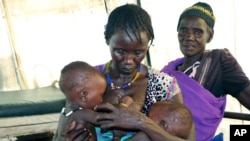A little more than two years ago, massive protests broke out across Sudan over the price of bread and fuel. Within four months, the protests led to the ouster of longtime President Omar al-Bashir and the formation of a new, transitional government that included pro-democracy leaders.
At that time, many Sudanese believed their country was on the path to significant change. But this week, tens of thousands of Sudanese returned to the streets, angry over soaring prices for the same necessities.
Sahar Al Jazouli, a member of Al Kalakla Abu Adam Resistance Committee, a grassroots group that helped organize this week’s protests, said people are fed up with skyrocketing inflation.
“The demands that we have been making since the time of President Bashir are still the same, and the high cost of living is at the top of them, and these demonstrations going on right now are a right that we earned through our civilian revolution,” Al Jazouli told VOA’s South Sudan in Focus.
The transitional government recently removed subsidies for fuel and other items, as part of economic reforms demanded by the International Monetary Fund.
Days after the fuel subsidies were eliminated in October, the price of diesel doubled. In the two months that followed, prices for a loaf of bread and a kilowatt of electricity more than tripled.
Mohamed Ali Fazari, editor-in-chief of the online newspaper Khartoum Today, said some protesters are demanding that the entire transitional government be removed if conditions do not improve quickly.
“In Al Fashir, the capital city of North Darfur state, in Blue Nile state’s city of Al Damazin and many other cities and they have the same demand. Prices of electricity, bread, and other basic commodities are the main issues that made people get out on the streets once again raising their demands for the downfall of the government, while others ask for immediate economic reforms,” Fazari told South Sudan in Focus.
He said different people have different agendas in the latest protests, including the Sudanese Professional Association, a group that mobilized many protesters in 2019.
“The other group is the communist parties and others that are against the economic policies of the government, and the other group which has another agenda like the Islamists and followers of the ousted regime,” said Fazari.
Both Fazari and Al Jazouli said the remaining pro-Bashir officials in office are looking to exploit the protests to undermine the transitional government and create chaos but the overwhelming majority of protesters are on the streets to demand better living conditions, not to remove the government.
Al Jazouli said Prime Minister Abdalla Hamdok and the Empowerment Removal Committee, which was tasked with dismantling the Bashir administration, should have taken decisive action and removed pro-Bashir loyalists from the government when they had the chance.
“There are people in government institutions and even those who are in charge of our bread and cooking gas [who] are elements from the previous Bashir administration. This government has neglected to remove them, hold them accountable, and try them for the criminals that they are,” Jazouli told VOA.
Sudanese Protest Over Bread, Fuel Prices
- By VOA News





